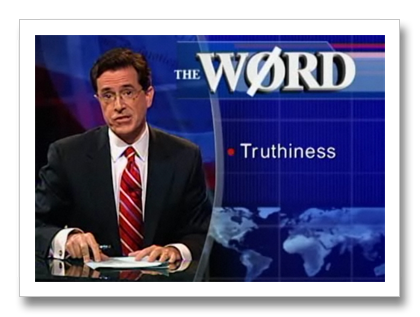Slides
Conditionals
Ref. WGR Chapter 6, Control-flow techniques
In this section we cover truth, falsiness, and conditions.
Truthiness and Falsiness

(*not* in the Steven Colbert sense)
- Truthy things make "if" succeed
- Falsey things make "if" fail
Falsey Things
nilfalse- that's it!
Truthy Things
true0"""false"- pretty much anything else
if
if condition then
statement
end
if
conditionis truthy then executestatement-
thenis optional, so you normally useif condition statement end
one-line if
if condition then statement end
if condition; statement; end
statement if condition
else
if condition
statement1
else
statement2
end
- if
conditionis truthy then executestatement1 - if
conditionis falsy then executestatement2
elsif
if condition1
statement1
elsif condition2
statement2
else
statement3
end
it's spelled elsif not elseif or else if
not
if x == 2
puts "two"
end
if not x == 2
puts "not two"
end
not vs. !
if x == 2
puts "two"
end
if not x == 2
puts "not two"
end
if !x == 2
puts "not what you think!"
end
! is clingy
The bang operator binds very tightly
not x == 2 #=> not (x == 2)
!x == 2 #=> (!x) == 2
so that actually means
ruby
if (!x) == 2
and assuming x is a number, !x will always be false
! gotcha solved
if !(x == 2)
puts "not two"
end
- Moral: use
notin conditions- or use
unless - or use
!= - or use a lot of parentheses
- they're free!
- or use
!=
- "bang equal" means "not equal"
-
x != 2is equivalent to!(x == 2)
unless
-
unlessmeans "if not"puts "night" unless day -
it can make your code read better
wear_sweater unless summer? or wearing_sweater? -
it can also make your code read worse
button.hide unless not button.disabled? -
never use
unlesswithnotorelse- unless you really know what you're doing
:-) - double negatives are not unconfusing
- unless you really know what you're doing
Logic is hard
| Statement | Value |
|---|---|
| not nil | true |
| not 0 | false |
| !0 | false |
| 0 == false | false |
| nil == false | false |
| y = false | false |
| y == false | true |
| x = 0 | 0 |
| "foo" if (x = 0) | "foo" |
| x == y | false |
| x != y | true |
| !x==y | true |
| not x==y | true |
(...let's go shopping)
Comparison or Assignment?
| Language | Statement | Purpose |
|---|---|---|
| mathematics | X = 2 | comparison |
| Basic | LET X = 2 | assignment |
| Fortran | X = 2 | assignment :-( |
| X == 2 | comparison | |
| Algol, Pascal | X := 2 | assignment :-) |
| X = 2 | comparison :-) |
"A notorious example for a bad idea was the choice of the equal sign to denote assignment. It goes back to Fortran in 1957 and has blindly been copied by armies of language designers. Why is it a bad idea? Because it overthrows a century old tradition to let "=" denote a comparison for equality, a predicate which is either true or false. But Fortran made it to mean assignment, the enforcing of equality. In this case, the operands are on unequal footing: The left operand (a variable) is to be made equal to the right operand (an expression). x = y does not mean the same thing as y = x."
— Niklaus Wirth, Good Ideas, Through the Looking Glass (2005)
assignment in conditionals
-
if x = 1gives a warning, since it will always be true -
if x = ygives no warning, since you might mean it- it still looks funny
-
it can be useful, e.g.
if (last_name = person.family_name) # person.family_name is not nil, so... puts last_name end
case
case var
when value1
puts "var is sorta value1"
when value2, value3
puts "var is sorta value2 or maybe value3"
else
puts "var is weird"
end
threequal
- case comparison uses the
===operator- aka "threequal"
- it's normally the same as
==but can be overridden- e.g. for Class,
===also meansis_a?, so you can do this:
- e.g. for Class,
case input
when Fixnum
input
when String
input.to_i
when Array
input.first.to_i
end
threequal transitivity gotcha
>> Fixnum === 1
=> true
>> 1 === Fixnum
=> false
Solution: use is_a? instead:
>> 1.is_a? Fixnum
=> true
a note on Boolean
There is no Boolean class in Ruby
Only TrueClass and FalseClass
(Why? This guy knows the answer.)
!!
-
!!converts anything into either true (if it's truthy) or false (if it's falsey) - but cool Rubyists never use
!!- they're down with truthiness
or-equals
def name
@name ||= "Anonymous"
end
- Means "if
@namehas a value, cool, but otherwise make it'Anonymous'" - Relies on "logical or" and "nil is falsey" semantics
- There's also "plus-equals" (
+=) and so forth
or-equals expanded
These are equivalent:
with or-equals
@name ||= "Alex"
as a boolean expression
@name || (@name = "Alex")
with an if statement
if (@name != nil) @name else @name = "Alex" end
Outline
- Conditionals
- Truthiness and Falsiness
- Falsey Things
- `if`
- one-line `if`
- `else`
- `elsif`
- `not`
- `not` vs. `!`
- `!` is clingy
- `!` gotcha solved
- `!=`
- unless
- Logic is hard
- Comparison or Assignment?
- assignment in conditionals
- `case`
- threequal
- threequal transitivity gotcha
- a note on Boolean
- `!!`
- or-equals
- or-equals expanded
- with or-equals
- as a boolean expression
- with an if statement